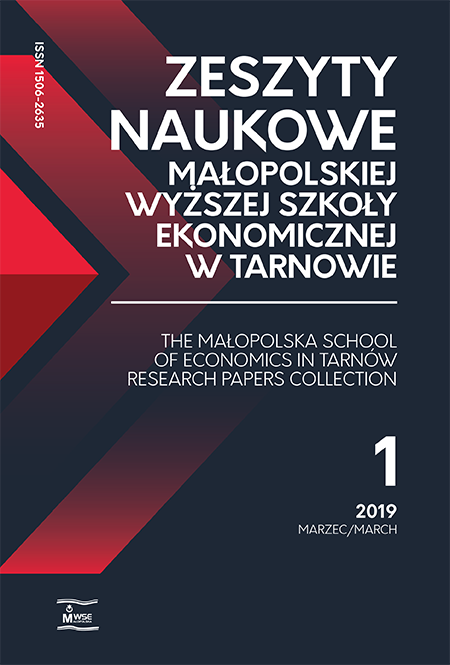Abstract
Highly developed countries owe their modern prosperity to the development of industry. A process known as the Industrial Revolution has been going on since the 18th century. Currently, there are four stages of this Revolution. The last of them conceptionally initiated already in 21st century. It is popularly called Industry 4.0. Its idea relies on fully robotization of production in the atmosphere of intelligent cities and buildings. It also involves the return of production from Asian countries to high technology countries. It is expected that there will be significant changes in scheme of employment structure and in the expansion of research structures. There will also be changes in staff training―especially in the field of technical sciences and IT. The direction of development of the architecture of new structures is unknown here. However, it is possible to suppose actions aimed at minimalism, abstractionism and emphasizing ecological aspects.
References
Barber, B.R. (2001). Dżihad kontra McŚwiat. Warszawa: Muza. ISBN 8373190708.
View in Google Scholar
BMBF. (2017). Industrie 4.0. Innovationen für die Produktion von morgen. Berlin: Bundesministerium für Bildung und Forschung.
View in Google Scholar
Gombrich, E.H. (2017). Krótka historia świata. Poznań: Dom Wydawniczy REBIS. ISBN 788380622487.
View in Google Scholar
Hazlitt, H. (2012). Ekonomia w jednej lekcji. Wrocław: Instytut Ludwiga von Misesa. ISBN 9788363250072.
View in Google Scholar
Hermann, M., Pentek, T., Otto, B. (2015). Design Principles for Industrie 4.0 Scenarios: A Literature Review. Working Paper, 2015(1). Dortmund: Technische Universität Dortmund, Fakultät Maschinenbau; Audi Stiftungslehrstuhl Supply Net Order Management.
View in Google Scholar
Huntington, S.P. (1998). Zderzenie cywilizacji i nowy kształt ładu światowego. Warszawa: Warszawskie Wydawnictwo Literackie Muza. ISBN 8372002967.
View in Google Scholar
Landers, D.S. (2005). Bogactwo i nędza narodów. Dlaczego jedni są tak bogaci, a inni tak ubodzy. Warszawa: Warszawskie Wydawnictwo Literackie Muza. ISBN 8372005060.
View in Google Scholar
Lis, K. (2014). Zdrowie pracowników w rozwijającej się gospodarce na przykładzie Polski. W: G. Dudarski, I. Gabryelewicz (red.). Techniczne i społeczne aspekty bezpieczeństwa pracy i ergonomii (s. 172–189). Zielona Góra: Oficyna Wydawnicza Uniwersytetu Zielonogórskiego. ISBN 9788378421641.
View in Google Scholar
Olender-Skorek, M. (2017). Czwarta rewolucja przemysłowa a wybrane aspekty teorii ekonomii. Nierówności Społeczne a Wzrost Gospodarczy, 51(3), 38–49.
View in Google Scholar
Ostrowska, A. (1999). Styl życia a zdrowie. Z zagadnień promocji zdrowia. Warszawa: Wydawnictwo Instytutu Filozofii i Socjologii PAN. ISBN 8387632333.
View in Google Scholar
Propst, R. (1971). Le bureau evolutif – un nouveau concept. Paris: Reboul & Fils.
View in Google Scholar
Studenski, R. (2010). Poprawianie natury. Atest. Ochrona Pracy, 3, 4–6.
View in Google Scholar
Szczeklik, A. (2012). Nieśmiertelność. Prometejski sen medycyny. Kraków: Wydawnictwo Znak. ISBN 9788324022359.
View in Google Scholar
Świątkowska, B. (red.) (2011). Coś, które nadchodzi. Architektura XXI wieku. Warszawa: Fundacja Bęc Zmiana. ISBN 9788362418121.
View in Google Scholar
Toffler, A., Toffler, H. (2007). Rewolucyjne bogactwo. Przeźmierowo: Wydawnictwo Kurpisz. ISBN 9788375240030.
View in Google Scholar
Tytyk, E., Butlewski, M. (2008). Wprowadzenie do techniki. Wykłady dla kierunku zarządzanie. Poznań: Wydawnictwo Politechniki Poznańskiej. ISBN 9788371438165.
View in Google Scholar
Wosińska, W. (2008). Oblicza globalizacji. Sopot: Smak Słowa. ISBN 9788392589709.
View in Google Scholar
Złowodzki, M., Juliszewski, T., Ogińska, H., Taczalska, A. (red.). (2016). Ergonomia wobec wyzwań nowych technik i technologii. Kraków: Wydawnictwo Politechniki Krakowskiej im. Tadeusza Kościuszki. ISBN 9788372428431.
View in Google Scholar
Złowodzki, M., Ogińska, H., Juliszewski, T., Pawlak, H. (red.). (2012). Ergonomia w warunkach gospodarki opartej na wiedzy. Kraków–Lublin: Komitet Ergonomii PAN. ISBN 9788393671007.
View in Google Scholar
© Copyright by Małopolska School of Economics in Tarnów. The articles are available under the Creative Commons Attribution NonCommercial-NoDerivatives 4.0 International License


